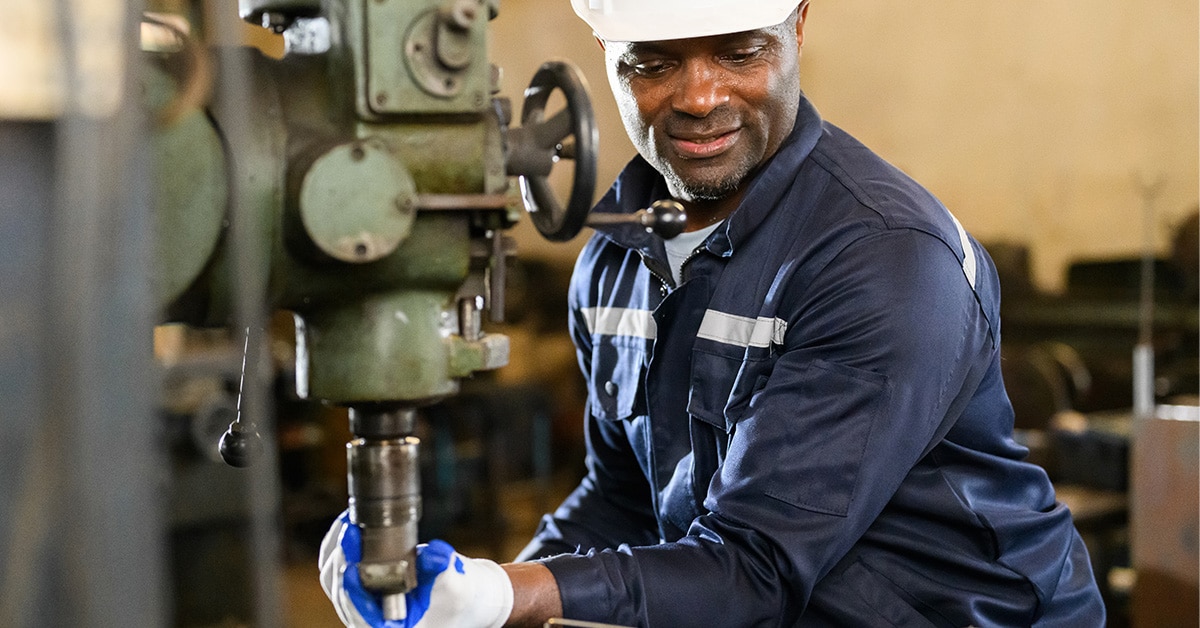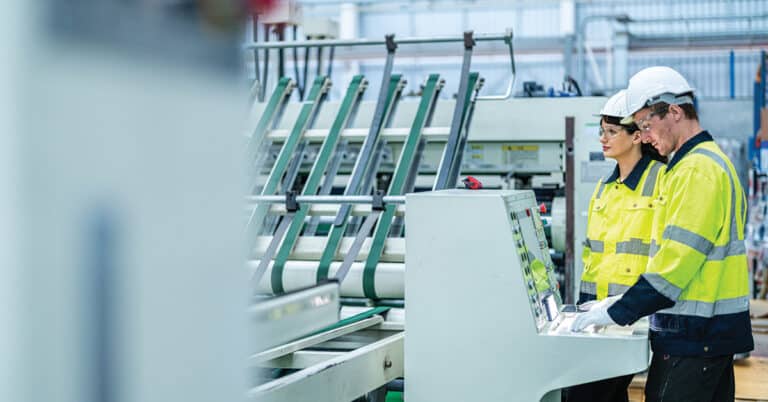Industrial maintenance technicians keep manufacturing equipment running. It’s always been an important role, but today, with increasing automation and more complex industrial technology, the job is more critical than ever.
When a manufacturing company is looking for new employees, or looking at developing the industrial technicians it already has, preference often goes to those with a formal certification. This blog looks at why certification is important, the options available, and how to get started. If you want to know how to become a certified maintenance tech, keep reading.
Introduction to maintenance technician certification
Maintenance technicians carry out routine servicing and diagnose and repair faults, but in industry there’s more to it than that. It’s important to work quickly, to follow standard procedures, to complete documentation, to work as part of a team, and most importantly, to keep themselves and others safe.
Certification is independent verification that a technician knows how to do all these things. It shows they’ve reached a defined level of understanding, experience, and capability, and have the ability to play this essential role. For a maintenance manager, HR manager, or plant manager, an applicant’s certification means that the hiring party doesn’t just need to take the person’s word for their level of skill; they have evidence to back it up.
The credibility provided by certification creates opportunities for maintenance technicians. Their commitment to continuing education and to going through this independent assessment, plus their trustworthiness and work ethic, make them attractive to current and future employers. When more desirable, senior-level, and higher-paying positions become available, certified employees are typically given priority consideration.
Steps to become a certified maintenance technician
There are many types of certifications for maintenance technicians to choose from as a first step. Some are general, others are more specific. For example, facility maintenance is different than industrial equipment maintenance. A facilities maintenance technician will work on HVAC systems and building problems rather than production machinery.
An industrial maintenance technician works on production equipment. Some industries have specialized equipment that requires certified technicians. (Medical device manufacturing is one example.)
Having decided which aspect of maintenance to pursue, you now have another decision to make. Do you want to work with a single type of equipment or technology, such as electrical and/or electronic systems? Alternatively, do you plan on working with/remaining with mechanical, hydraulic or pneumatic systems?
Next, try speaking with maintenance and/or facilities management at your current place of employment. They may be very supportive, and have useful advice to offer. In addition, if any of the technicians in industrial equipment or facility maintenance are already certified, ask their views on it.
Certification requirements and skills needed
Most certification organizations are more interested in practical skills than formal academic history. However, a GED or equivalent is usually required. Some practical experience is needed before taking the exam or tests, and some organizations expect candidates to take training classes in advance, too.
While certifications vary, most look at a few common aspects. These include a mix of hard and soft skills.
Under hard skills, candidates are expected to:
- Understand how the technologies they want to work with operate
- Be able to perform routine inspection tasks and identify abnormal signs or conditions
- Carry out routine servicing tasks as needed by equipment condition
Soft skills include:
- Knowing how to work safely, and how to keep others safe
- The ability to diagnose problems quickly and safely
- Good communication skills
- The ability to work in a team
A challenge in the maintenance technician job is staying current with technological advances. For example, 3D printing, IoT sensors, and cobots are all recent technologies, and many more will arrive in the years ahead.
To address this, most certifications have a time limit, after which the technician is expected to retest.
Online certification programs and their benefits
Today, most certification bodies run or offer online programs. Among the leading organizations to consider are:
- The Society for Maintenance & Reliability Professionals (SMRP): They run both the Certified Maintenance & Reliability Technician (CRMT) and the Certified Maintenance & Reliability Professional (CMRP) programs. The CMRT is more practically oriented, while the CMRP has a greater emphasis on supervisory responsibilities.
- NCCER: While their emphasis is on construction, they do offer the Industrial Maintenance Mechanic program.
- ETA® International (ETA): Provides multiple levels of Certified Electronics Technician certification.
- National Institute for Metalworking Skills (NIMS): Offers programs in hydraulics, pneumatics and more.
Each of these organizations has specific requirements, which you can find on their websites.
An online certification program offers several advantages over those provided in physical settings. They provide a lot of flexibility in terms of when to study, which can be especially useful for those working shifts or with family commitments. They also don’t need any travel, which can be a time and cost-saver.
However, two limitations to consider are the lack of a formal schedule, and the absence of colleagues to discuss problems with. Online programs require a great deal of self-discipline and a reliable internet connection, so bear these factors in mind.
Cost of certification and financial aid options
These various certification programs do come with costs. Many have significant fee for the exam itself, and for any classes required, which may require materials and tools. Many organizations also require candidates to sign up for membership, which carries an annual fee.
If your current employer supports the idea of you becoming certified, they may be willing to carry some or all the costs. If not, or if you’re not currently working, you should ask the certification bodies for details of any scholarships and financial aid options they can offer.
Other financial support may be available for veterans, and from private organizations like the Mike Rowe Works Foundation and the Home Depot Path-to-Pro organization.
Don’t let the costs deter you from pursuing certification. This is an investment in your future, so even if you have to save first or defer a vacation or some evenings out, it’s worth doing.
Career advancement and opportunities
Certification is validation of your skills, knowledge, and capabilities. It shows employers that you have reached a defined level of expertise and understand current codes, standards, and practices. This tells them they can trust you with a range of maintenance tasks.
When recruiting maintenance workers, many industrial businesses specify that certification is either required or preferred. Even if they don’t spell this out, certified candidates typically still have an edge over those who aren’t.
Certification also supports continued career advancement. It shows managers and HR that you take your career seriously and want to keep your skills up to date. When new or more senior positions open up, an internal candidate with a relevant certification typically will be given more consideration than those without.
Many certified maintenance technicians progress into engineering roles, often by enrolling in an associate degree program. Others will take a more supervisory role, moving into maintenance supervision and even management. Whichever route you choose, one thing is clear: maintenance certification will open doors to new opportunities.
Safety standards and best practices
There are a lot of hazards in manufacturing operations and industrial facilities, and staying safe is always the first thing to consider. All certification programs for any kind of industrial maintenance mechanic or reliability technician give the highest priority to ensuring everyone knows how to work safely and keep others safe.
For anyone wishing to reinforce or upgrade their safety knowledge, there are two OSHA programs to consider. Known as OSHA 10 and OSHA 30 (the numbers refer to the hours required), both aim to provide essential education for staying safe in industrial, construction, and other work environments.
Independent skills verification for career and business success
In the world of industrial maintenance, with high-value equipment, output, and even lives at stake, training and continuous education is extremely important. That’s why maintenance technician certification is so valuable.
For employers, certification shows that a technician has had their skills independently assessed, and that they meet a required level of knowledge. This reduces the need to follow up with references and perhaps set their own tests, and increases confidence in the person they are looking to hire.
For technicians, certification makes them a more attractive resource. It opens doors that would otherwise stay closed, and can lead to more attractive and rewarding opportunities.
If you’re interested in becoming certified, the steps in this blog will get you started. First decide what type of certification makes the most sense for your skills and the industry you work in, or want to work in. Then, contact the certification organizations and find out what’s needed. From there, select a program, sign up, and get started.






